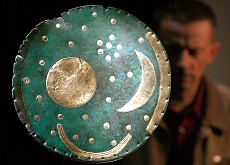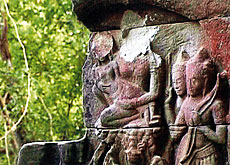Art market buoyed by new trading rules

Legislation introduced six months ago to combat art trafficking has already boosted Switzerland's standing as a place for dealing in cultural goods, say officials.
The Federal Culture Office says dealers have acted positively to the changes, which were designed to put an end to anonymous trading.
“Cultural goods are definitely no longer easier to import than tomatoes,” Andrea Raschèr, head of international and legal matters at the Federal Culture Office, told swissinfo.
“There is more transparency when importing, exporting and storing goods, and there is better collaboration with dealers, museums and customs authorities.”
The new legislation, which came into effect on June 1, brought Switzerland into line with the 1970 Unesco Convention against cultural goods trafficking.
In the past the country had earned an unwelcome reputation as a transit point for stolen works of art because of its previous reluctance to tighten laws on the transfer of cultural goods.
Positive feedback
Under the new legislation, art dealers and auction houses are obliged to identify who they do business with. They now have to keep accounts of their dealing activities as well as detailed information on goods exchanged.
Raschèr said the reaction among dealers had been “extremely positive”, citing an article in the trade magazine Weltkunst which acknowledged that the change had given Switzerland a competitive advantage.
“We’re still in the sensitisation and information phase,” he said. “But all the signs from inquiries and feedback indicate dealers and auction houses are taking the implementation of due diligence seriously.”
Raschèr added that Switzerland’s ratification of the Unesco Convention has also been greatly welcomed by the international community.
“You no longer hear the accusations that Switzerland acts as a hub for illegal trading,” he said.
Specialist unit
A specialist unit at the Federal Culture Office has been monitoring the trade in cultural goods since June to ensure it complies with the new legislation.
Under the new law, cultural goods of unknown origin – which are often stolen – cannot be sold in Switzerland for 30 years. Previously the limit was five years.
However, the law does not apply to works of art whose purchase price is less than SFr5,000 ($3,900).
“The specialist unit’s work is divided into three stages,” Raschèr explained. “First, informing and sensitising; second, checking imports and exports at customs. The third stage – starting in 2006 – is checking dealers and auction houses.”
“The unit works closely with the customs authorities, and packages are checked on a daily basis. But so far no controls on dealers have taken place.”
Trade hub
The Federal Culture Office says Switzerland is among the art world’s five biggest trade hubs, with a market worth SFr1.5 billion.
“The overall result for Switzerland as a place for dealing in cultural goods has been positive,” Raschèr said. “As soon as a country has tighter laws, it is avoided by illegal traders because costs and risks are too high compared with the benefits.”
Raschèr added that the law hadn’t had a negative effect on turnover because legal goods commanded higher prices.
“When the authenticity of an artefact can be guaranteed, a collector is prepared to pay more for it. The hope is that these clearer rules will move Switzerland up from fifth to fourth place in global trade.”
swissinfo, Thomas Stephens
1962: Switzerland ratified The Hague convention for the protection of cultural property in the event of armed conflict.
October 2003: Swiss ratification of the 1970 Unesco convention against illegal trafficking of cultural property.
June 2005: New legislation comes into effect in Switzerland in line with the Unesco convention. It was approved by parliament in 2003.
On June 1, 2005, legislation came into effect obliging art dealers and auction houses to identify customers. Foreign owners of stolen artwork now have 30 years to claim it back.
Switzerland is among the art world’s five biggest trade hubs. The import and export of cultural goods is a SFr1.5 billion market in Switzerland.

In compliance with the JTI standards
More: SWI swissinfo.ch certified by the Journalism Trust Initiative












You can find an overview of ongoing debates with our journalists here . Please join us!
If you want to start a conversation about a topic raised in this article or want to report factual errors, email us at english@swissinfo.ch.